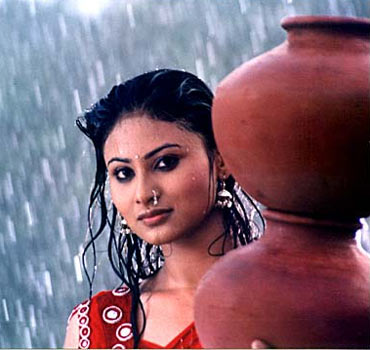
The scheming women characters of saas-bahu soaps have quietly replaced the strong-willed and independent protagonists of Shanti and Rajini of mid- nineties and the TV producers attribute the change to "audience demand".
But does the 21st century woman today relate to the larger-than-life saintly creature with impossible ideals or the conniving vamps shown on the small screen?
TV Actress Shruti Ulfat, who is back on the small screen after a hiatus, with Sasural Genda Phool, a light hearted comedy series, feels daily soaps mock women and society.
"I have never really done a daily soap. I don't like daily soaps because I believe they are mocking the Indian society, they are mocking the way women dress up, the way they think...," Ulfat said.
The Aarara actress, Ketaki Dave, who grabbed the limelight for her comic timing in Kyunki Saas Bahu Thi is back on prime time slot with Star Plus's Behenein, believes the vamp has become stronger than the heroine these days which might not be a progressive sign for TV.
"I totally agree that negative characters are much stronger in television which is not quite a good impression on the audience," Ketaki said.
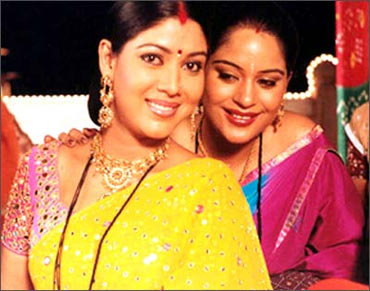
During the time of Doordarshan, the focus of the media was on elevating the woman's status in the society.
In the 90s focus was more on the urban woman who wanted to step out of the house and work, have equal rights as a man and who wanted to fight her own battles.
With the starting of the millennium, came the glitz and glamour of cable TV allowing space for competition and newer concepts.
Focus moved from the middle class to the rich class with the emergence of saas-bahu serials. The feisty, forward thinking woman of the 90's was replaced by either the battered one asking for justice or the ornamented scheming vamp always trying to get her hands on the family property.
Star India, which started the whole era of soaps with Kyunki Saas Bhi Kabhi Bahu Thi and Kahani Ghar Ghar Ki, believes that the women audience today are not interested in watching the "rebels" like 'Rajini' and 'Shanti'.
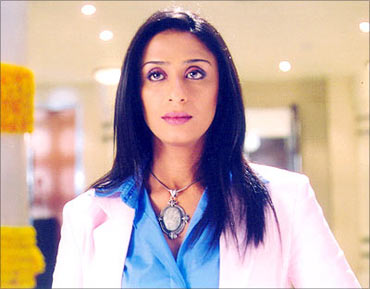
"According to our research, the women are interested in female characters which are more family oriented. The characters may not be ambitious for themselves but they do fight for the rights of their family which is a major draw to our serials," Vasudha Jha, Vice President, Corporate Communication, Star India, said.
However, Colours' EVP Ashvini Yardi, says, "Today every woman in urban India is a Rajni or a Shanti. For a woman, working outside the house is of utmost importance in order to run a household as a single income isn't enough."
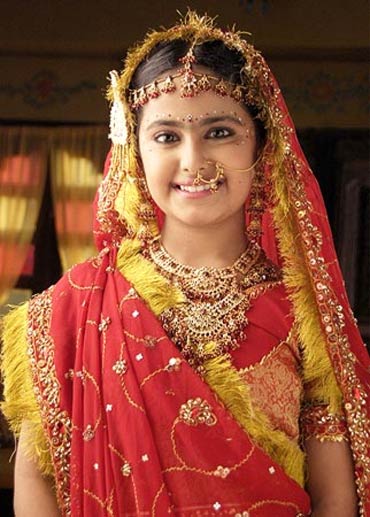
As television reached the interiors of the country a new group of audience emerged giving way to issue-based serials like Balika Vadhu, Agle Janam Mohe Bitiya Hi Kijo, Naa Ana Iss Des Lado, Uttaran centering the woman in the village grappling with issues from female foeticide to child marriage.
"It is now the age of creating awareness and bringing malpractices carried out in the backyard of the country, out into the open. The focus today is on telling stories hitherto untold," Yardi said.
While the issue-based serials have indeed been thought provoking, some complain that they soon lose their track after few episodes.
"Lately so many shows have been happening on TV that reflect the background, culture etc of India. The shows do highlight issues related to women such as child marriage, girl child born in a family, domestic violence etc, but I feel it is very regressive. These shows are not giving ideas how to tackle these issues," Ulfat said.
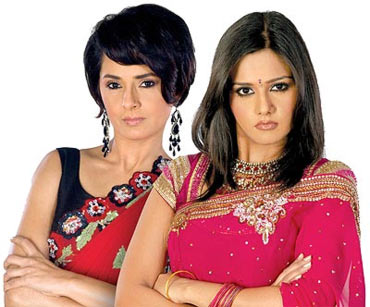
Which is why the female characters on the small screen are not inspirational anymore as women always look up to strong characters, who fight for a change and bring a reform, states clinical psychologist Dr Aruna Broota.
"The soaps these days are regressive in nature which want to show women standing behind men. With the coming of women education, females are inspirational for both themselves and their family even if they are housewives. These serials are just handing over the power back to men which other wise is slowing shifting toward women," Broota said.
"Serials like Balika Vadhu and Lado do have a message. But the women characters in such shows cannot be treated as inspirations as they are suffering endlessly with no perfect solution. The Indian woman today, whether working or housewives, are educated and confident to find solutions to their problems," Broota added.